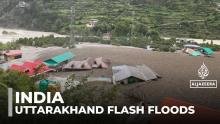12 years after Delhi serial blasts, 2 accused freed
16 Feb 2017 ( IBTN News Bureau )
Almost 12 years after the 2005 serial blasts in Delhi which claimed 67 lives, a trial court on Thursday acquitted two of the accused -- Mohd Hussain Fazli and Mohd Rafiq Shah -- of all charges, saying the prosecution had “miserably failed” to prove their guilt.
A third accused, Tariq Ahmed Dar, was held guilty of being a member of the Lashkar-e-Taiba, but the court said it didn’t find sufficient evidence to link him to the blasts. Acquitting Dar of the charges of conspiracy to wage a war against the government by carrying out the blasts, the court also said the prosecution had failed to establish a link between Dar and the duo who have been acquitted.
Dar was convicted under Section 38 (being a member of a terror organisation) and Section 39 (giving support to such outfit) of the Unlawful Activities Prevention Act (UAPA). Additional Sessions Judge Reetesh Singh, however, held that Dar had already spent over 10 years in jail -- the maximum punishment prescribed under the law for these offences.
Observing that the “essence of conspiracy is a meeting of minds,” the court said, “prosecution has not been able to prove any link between Mohd Hussain Fazli and Mohd Rafiq Shah on one hand and Tariq Ahmed Dar on the other. Contents of the (intercepted) conversation therefore fall short in enabling the court to come to any definite conclusion that Tariq Ahmed Dar was part of the conspiracy behind the blasts.”
The court observed that the prosecution’s case was primarily built around intercepted conversations between Dar and an LeT operative named Abu Al Kama, that reportedly took place on November 1, 2005 and November 4, 2005.
“In the absence of any evidence regarding Tariq Ahmed Dar being involved in any conspiracy behind these blasts, none of the charges against Dar is made out,” said the court. It, however, added that there was sufficient evidence to establish his link with the LeT. “Even though no charges were framed against Tariq Ahmed Dar for offences under Section 38 and 39 of the UAPA…there is no bar under law to hold him guilty for both these offences,” it said.
The prosecution had claimed that Fazli had also contacted LeT operatives, and he had later led the probe team to Shah.
But the court said today that “the evidence regarding the fact that police were led to Mohd Rafiq Shah by Mohd Hussain Fazli is rather sketchy.”
“Even if Mohd Hussain Fazli had, in fact, led the team to Mohd Rafiq, it cannot be said that he was conspiring with Mohd Rafiq or any other accused with respect to the blasts… The failure of the prosecution to prove any involvement of Mohd Rafiq Shah… points to the direction that there is no evidence to hold that Mohd Hussain Fazli was involved in any manner with the conspiracy behind the blasts,” said the court.
The prosecution had claimed that the accused had entered into a criminal conspiracy to wage a war against the country and planned the serial blasts.
Two others, Farooq Ahmed Batloo and Ghulam Ahmed Khan, who were charged with funding terror, had earlier pleaded guilty. They were let off by the court as they had already undergone the jail term.
Five other accused -- Abu Ozefa, Abu Al Kama, Rashid, Sazid Ali and Zahid -- are still at large and are said to be in Pakistan-occupied Kashmir.
The Diwali-eve serial blasts at three places -- Sarojini Nagar, Paharganj and Kalkaji -- on October 29, 2005 killed 67 people and left over 225 injured.
(Click here for Android APP of IBTN. You can follow us on facebook and Twitter)
Share This News
About sharing
-
 15 Nov 2025
Why did the Grand Alliance suffer a crushing defeat in the 2025 Bihar Assembly elections?: Analysis
15 Nov 2025
Why did the Grand Alliance suffer a crushing defeat in the 2025 Bihar Assembly elections?: Analysis
Why did the Grand Alliance suffer a crushing defeat in the 2025 Bihar Assembly elec...
-
 12 Nov 2025
LIVE: India, Pakistan launch probes after blasts in New Delhi, Islamabad
12 Nov 2025
LIVE: India, Pakistan launch probes after blasts in New Delhi, Islamabad
LIVE: India, Pakistan launch probes after blasts in New Delhi, Islamabad
-
 11 Nov 2025
Delhi Red Fort blast live: Terrorism law invoked in India after 13 killed
11 Nov 2025
Delhi Red Fort blast live: Terrorism law invoked in India after 13 killed
Delhi Red Fort blast live: Terrorism law invoked in India after 13 killed<...
-
 05 Aug 2025
At least four dead, dozens missing as flash floods hit north India village
05 Aug 2025
At least four dead, dozens missing as flash floods hit north India village
At least four dead, dozens missing as flash floods hit north India village
-
 12 Jun 2025
Air India flight crashes in Ahmedabad with more than 240 people on board
12 Jun 2025
Air India flight crashes in Ahmedabad with more than 240 people on board
Air India flight crashes in Ahmedabad with more than 240 people on board



